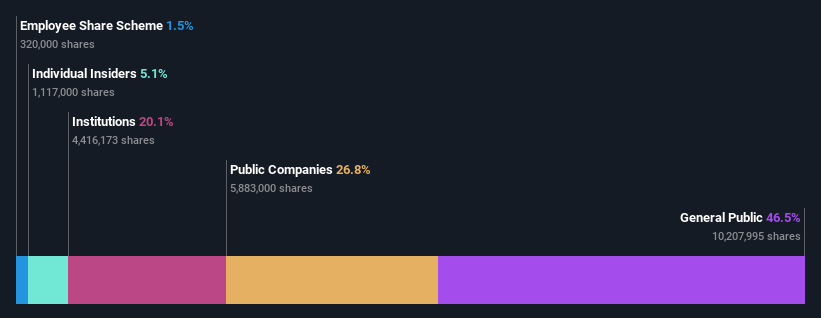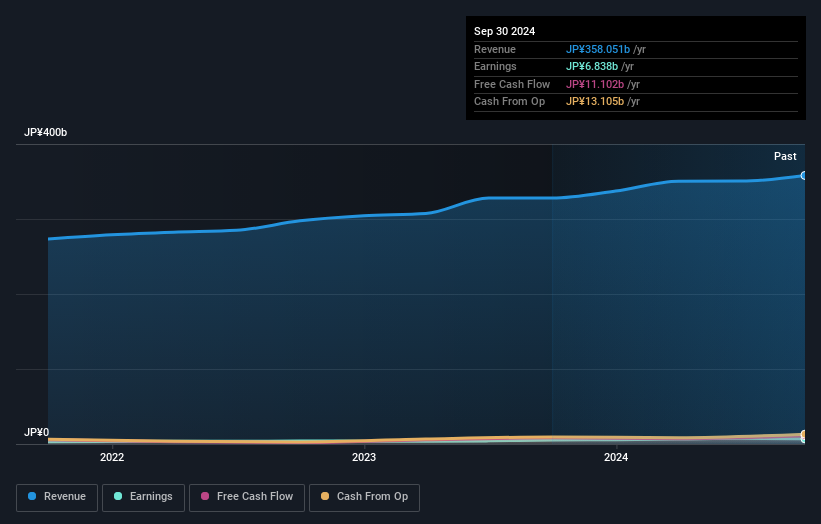- Japan
- /
- Retail Distributors
- /
- TSE:7552
Retail investors invested in Happinet Corporation (TSE:7552) copped the brunt of last week's JP¥7.9b market cap decline

Key Insights
- Significant control over Happinet by retail investors implies that the general public has more power to influence management and governance-related decisions
- The top 12 shareholders own 50% of the company
- Institutions own 20% of Happinet
If you want to know who really controls Happinet Corporation (TSE:7552), then you'll have to look at the makeup of its share registry. We can see that retail investors own the lion's share in the company with 47% ownership. That is, the group stands to benefit the most if the stock rises (or lose the most if there is a downturn).
As a result, retail investors as a group endured the highest losses last week after market cap fell by JP¥7.9b.
Let's delve deeper into each type of owner of Happinet, beginning with the chart below.
View our latest analysis for Happinet

What Does The Institutional Ownership Tell Us About Happinet?
Institutional investors commonly compare their own returns to the returns of a commonly followed index. So they generally do consider buying larger companies that are included in the relevant benchmark index.
Happinet already has institutions on the share registry. Indeed, they own a respectable stake in the company. This suggests some credibility amongst professional investors. But we can't rely on that fact alone since institutions make bad investments sometimes, just like everyone does. It is not uncommon to see a big share price drop if two large institutional investors try to sell out of a stock at the same time. So it is worth checking the past earnings trajectory of Happinet, (below). Of course, keep in mind that there are other factors to consider, too.

Happinet is not owned by hedge funds. Our data shows that BANDAI NAMCO Holdings Inc. is the largest shareholder with 27% of shares outstanding. Meanwhile, the second and third largest shareholders, hold 6.3% and 3.1%, of the shares outstanding, respectively. Additionally, the company's CEO Kazuhiko Naede directly holds 1.0% of the total shares outstanding.
After doing some more digging, we found that the top 12 have the combined ownership of 50% in the company, suggesting that no single shareholder has significant control over the company.
Researching institutional ownership is a good way to gauge and filter a stock's expected performance. The same can be achieved by studying analyst sentiments. Our information suggests that there isn't any analyst coverage of the stock, so it is probably little known.
Insider Ownership Of Happinet
The definition of company insiders can be subjective and does vary between jurisdictions. Our data reflects individual insiders, capturing board members at the very least. Company management run the business, but the CEO will answer to the board, even if he or she is a member of it.
I generally consider insider ownership to be a good thing. However, on some occasions it makes it more difficult for other shareholders to hold the board accountable for decisions.
We can see that insiders own shares in Happinet Corporation. In their own names, insiders own JP¥4.8b worth of stock in the JP¥95b company. It is good to see some investment by insiders, but it might be worth checking if those insiders have been buying.
General Public Ownership
The general public-- including retail investors -- own 47% stake in the company, and hence can't easily be ignored. While this group can't necessarily call the shots, it can certainly have a real influence on how the company is run.
Public Company Ownership
It appears to us that public companies own 27% of Happinet. This may be a strategic interest and the two companies may have related business interests. It could be that they have de-merged. This holding is probably worth investigating further.
Next Steps:
I find it very interesting to look at who exactly owns a company. But to truly gain insight, we need to consider other information, too. Case in point: We've spotted 1 warning sign for Happinet you should be aware of.
Of course this may not be the best stock to buy. Therefore, you may wish to see our free collection of interesting prospects boasting favorable financials.
NB: Figures in this article are calculated using data from the last twelve months, which refer to the 12-month period ending on the last date of the month the financial statement is dated. This may not be consistent with full year annual report figures.
Valuation is complex, but we're here to simplify it.
Discover if Happinet might be undervalued or overvalued with our detailed analysis, featuring fair value estimates, potential risks, dividends, insider trades, and its financial condition.
Access Free AnalysisHave feedback on this article? Concerned about the content? Get in touch with us directly. Alternatively, email editorial-team (at) simplywallst.com.
This article by Simply Wall St is general in nature. We provide commentary based on historical data and analyst forecasts only using an unbiased methodology and our articles are not intended to be financial advice. It does not constitute a recommendation to buy or sell any stock, and does not take account of your objectives, or your financial situation. We aim to bring you long-term focused analysis driven by fundamental data. Note that our analysis may not factor in the latest price-sensitive company announcements or qualitative material. Simply Wall St has no position in any stocks mentioned.
About TSE:7552
Flawless balance sheet average dividend payer.
Market Insights
Community Narratives



